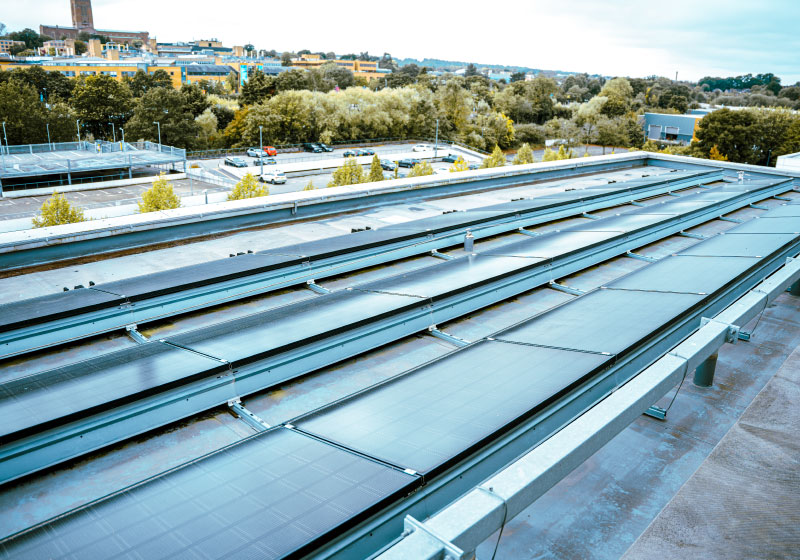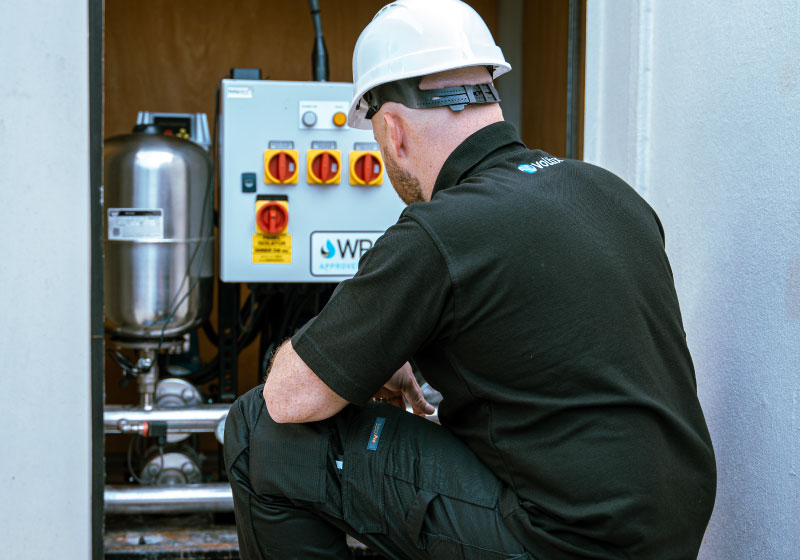Environmental, Social, Governance
What is ESG?
Environmental, social, governance (ESG) are the three columns of a building that measure its impact and sustainability in a modern business environment. ESG frameworks are becoming increasingly important for commercial real estate, industry and commercial enterprises. These principles are reflected in a growing body of regulations that require environmental awareness and social responsibility.
In the race to reach 2030 net-zero targets, this is more important than ever. From energy efficiency to air quality and building safety, we help businesses to benchmark, implement and report on ESG processes. Using IoT technologies for data-inspired strategies, we are by your side to boost efficiency and meet the changing needs of tenants, stakeholders and ESG frameworks.

What are ESG frameworks?
ESG has become a mainstream concern for all businesses. There are no uniform standards to guide ESG reporting. While hundreds of ESG frameworks exist, specific standards have emerged as the preferred guidelines for ESG implementation and reporting. Examples include the Sustainable Financial Disclosure Regulations (SFDR) in the EU and the Sustainable Disclosure Regulations (SDR) in the UK. These ESG frameworks guide the metrics you should focus on, reporting and plans for future ESG strategies.
Work Out Your Environmental Impact
Our carbon calculator gives you an idea of the impact of your operations – and helps you to accelerate change through awareness. Use our free carbon calculator.
The ESG Pillars in Action
Environmental
The urgency of net-zero is reflected in regulations like MEES. The environmental component of ESG encompasses various elements, but energy efficiency is a top priority. We install smart meters, support smart energy monitoring and management and assist with EV and solar solutions that support the business case for sustainable environmental change.

Social
Social elements like human health and safety at the workplace fall squarely within the social component of ESG. Our services touch on the social pillar of ESG in many ways, including smart air quality monitoring, fire safety and compliance processes. This social focus has the added benefit of attracting and securing talent and safeguarding their wellbeing.

Governance
Ethics and transparency are essential principles under the governance pillar of ESG. The role of data in this cannot be understated as it provides evidenced alignment of values, management policies and ESG implementation. IoT sensors, building modelling and digital twins are advanced solutions that support good governance. Risk management is another critical factor that is supported by specialist facilities maintenance processes.

Environmental
The urgency of net-zero is reflected in regulations like MEES. The environmental component of ESG encompasses various elements, but energy efficiency is a top priority. We install smart meters, support smart energy monitoring and management and assist with EV and solar solutions that support the business case for sustainable environmental change.

Social
Social elements like human health and safety at the workplace fall squarely within the social component of ESG. Our services touch on the social pillar of ESG in many ways, including smart air quality monitoring, fire safety and compliance processes. This social focus has the added benefit of attracting and securing talent and safeguarding their wellbeing.

Governance
Ethics and transparency are essential principles under the governance pillar of ESG. The role of data in this cannot be understated as it provides evidenced alignment of values, management policies and ESG implementation. IoT sensors, building modelling and digital twins are advanced solutions that support good governance. Risk management is another critical factor that is supported by specialist facilities maintenance processes.

ESG Consulting Services
Simplify ESG in Business
Turn complex ESG requirements into actionable business outcomes.
Get Started with Your ESG Strategy and Unlock the Benefits
Tenant Retention
Tenants are willing to pay higher rentals for environmentally sustainable and resilient commercial buildings.
ESG is a key tool used by investors and financiers to assess the risk and opportunities associated with commercial real estate.
Safeguard Continuity
Focusing on environmental, social and governance features builds robust processes and future-ready buildings.
Reduce consumption without compromising on performance – and reduce the expense of utilities.
Accountability and Transparency
Utilise data to implement transparent processes for ESG accountability and informed strategic decision-making.
Many ESG touchpoints directly impact occupant health, safety and wellbeing. Achieve the highest safety and security standards today and over time.
Prepare for the Future
ESG is laying the groundwork for commercial buildings of the future. Prepare today to ensure you don’t get left behind.
Get ready for ESG compliance – and meet environmental and building compliance requirements today.
Frequently Asked Questions
Everything you need to know about ESG and sustainability in business.
What is ESG in business?
ESG stands for Environmental, Social and Governance. It refers to the set of standards businesses follow to operate responsibly, reduce environmental impact, ensure social responsibility and maintain transparent governance practices.
Why is ESG important for companies?
Implementing ESG practices helps businesses reduce risks, improve operational efficiency, attract investors and build trust with customers and stakeholders. ESG compliance is increasingly linked to financial performance and long-term sustainability.
How can facilities management support ESG goals?
Facilities management contributes to ESG by improving energy efficiency, reducing waste, maintaining sustainable building systems and ensuring compliance with environmental and social regulations. Monitoring and reporting tools help track progress and demonstrate accountability.
What are the environmental aspects of ESG?
Environmental considerations include energy efficiency, carbon footprint reduction, water management, waste management and the adoption of renewable energy sources. Facilities maintenance and operational strategies can have a direct impact on these areas.
What social factors are covered in ESG?
Social aspects focus on employee wellbeing, health and safety, community engagement, diversity and inclusion and ethical labour practices. Facilities and operations teams can enhance social responsibility by ensuring safe, accessible and comfortable work environments.
What governance practices are part of ESG?
Governance involves transparent leadership, regulatory compliance, ethical decision-making, data protection, risk management and stakeholder engagement. Proper documentation and reporting are essential for meeting governance standards.
How can businesses report on ESG performance?
Companies can report ESG performance through frameworks like TCFD, SECR, CSRD and SDR. Facilities data, energy usage reports and compliance records support these disclosures, helping businesses meet investor and regulatory expectations.
Can ESG initiatives improve cost efficiency?
Yes. By optimising energy usage, reducing waste and implementing sustainable maintenance practices, businesses can lower operational costs while improving environmental performance.
Work with Voltix Services for ESG Consulting Solutions
Find out how our comprehensive facilities maintenance solutions and digital innovations are built to drive ESG in your commercial building.
